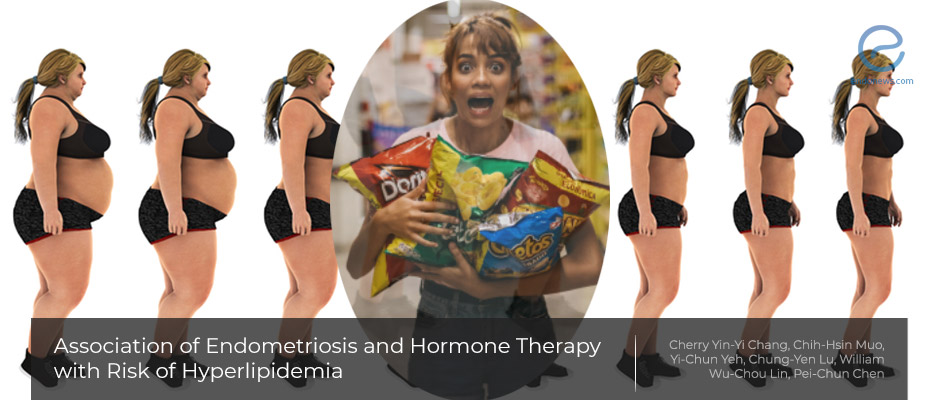Bad bad lipid go away!
Oct 22, 2020
Getting fat - What is to blame?
Key Points
Highlight:
- This is a retrospective study that investigated the risk of hyperlipidemia in women with endometriosis and hormone therapy.
Importance:
- There is a moderately increased risk of developing hyperlipidemia in women with endometriosis.
What has been done:
- A retrospective cohort study in women with endometriosis and hormone therapy from health insurance in Taiwan.
- The study cohorts included 9,155 women aged 20-55 years with endometriosis diagnosed from 2000-2013, and 212,641 control women without endometriosis.
Results:
- The incidence of hyperlipidemia was higher among women with endometriosis than in the non-endometriosis group. The age-stratified analysis showed that endometriosis was associated with an increased risk of hyperlipidemia in women aged 35-55y.
- In the analyses for evaluating treatments, both hysterectomy and/or bilateral oophorectomy and hormone use were associated with the risk of developing hyperlipidemia.
- The association between endometriosis and hyperlipidemia was attenuated after further adjustments for hysterectomy and/or bilateral oophorectomy (46.9%) and hormone use(21.6%).
- Women with endometriosis are at an increased risk of hyperlipidemia: however, hormone therapy was not independently associated with it.
Limitation:
- Some endometriosis cases may have been misclassified because they were identified using diagnostic codes and a claim for a transvaginal or abdominal ultrasound, which is may not be reliable for endometriosis diagnosis.
- Misclassification of hyperlipidemia may also occur because it was based on a prescription for lipid-lowering drugs, rather than lipid levels or body mass index.
Lay Summary
Much like the progression of endometriosis, accumulating evidence suggests that systemic chronic inflammation and oxidative stress can contribute to atherosclerosis. The excess low-density lipoprotein increases inflammatory processes in the arteries, which may result in atherosclerosis. Previous studies have shown that women with endometriosis are more likely to have higher levels of low-density lipoprotein cholesterol and triglyceride, and a lower level of high-density lipoprotein cholesterol than non-endometriosis subjects. In addition, a relationship between endometriosis and hypercholesterolemia was also reported. However, the association between hormonal medications used for treating endometriosis and lipid profiles is not available.
This study by Yi Chang et al., from the Department of Public Health, China Medical University, Taichung, Taiwan investigated the association between endometriosis and hyperlipidemia in Asian women using insurance claims data. The effect of hormone therapy use after endometriosis diagnosis and the risk of developing hyperlipidemia was also examined. The study results were published in the "American Journal of Epidemiology".
This is a retrospective cohort study with health insurance claims data from Taiwan’s National Health Insurance program, which a compulsory social insurance program covering with over 99% of Taiwan’s citizens. The authors identified women aged 20-55 years diagnosed with endometriosis from 2000 to 2013. The same-aged women on the index date with no endometriosis were assigned as a non-endometriosis group.
Data on prescriptions for hormonal medications were evaluated. The subjects took either one of the following medication groups: progesterone-only, progesterone and estrogen combination, co-prescription progesterone and progesterone/estrogen, and none of the above.
Hyperlipidemia incidence was higher in women with endometriosis than in the non-endometriosis group. After multivariable adjustments, women with endometriosis was associated with an increased risk of hyperlipidemia at the age of 35 to <55 years, but not in the younger age group. Proportion analyses showed that hysterectomy and/or bilateral oophorectomy accounted for 46.9% of the association between endometriosis and hyperlipidemia, whereas hormone usage accounted for 21.6%. Data reported in this study in Taiwan showed a moderately increased risk of hyperlipidemia with endometriosis, which is in line with the observations from other studies. The mechanisms behind the link between endometriosis and hyperlipidemia are unclear, however possible explanations include chronic inflammatory status in endometriosis, which may impair lipid metabolism. Studies have also suggested estrogen may affect the lipid profile.
This study suggests a moderate risk of developing hyperlipidemia in women with endometriosis. Hysterectomy and/or bilateral oophorectomy may partly be the reason for the association. Hence, the lipid profile of women with endometriosis should be monitored by caregivers. More studies are required to understand the mechanisms behind this association.
Research Source: https://pubmed.ncbi.nlm.nih.gov/32803257/
fat weight cholesterol endometriosis; hormone therapy; hyperlipidemia; women health.

